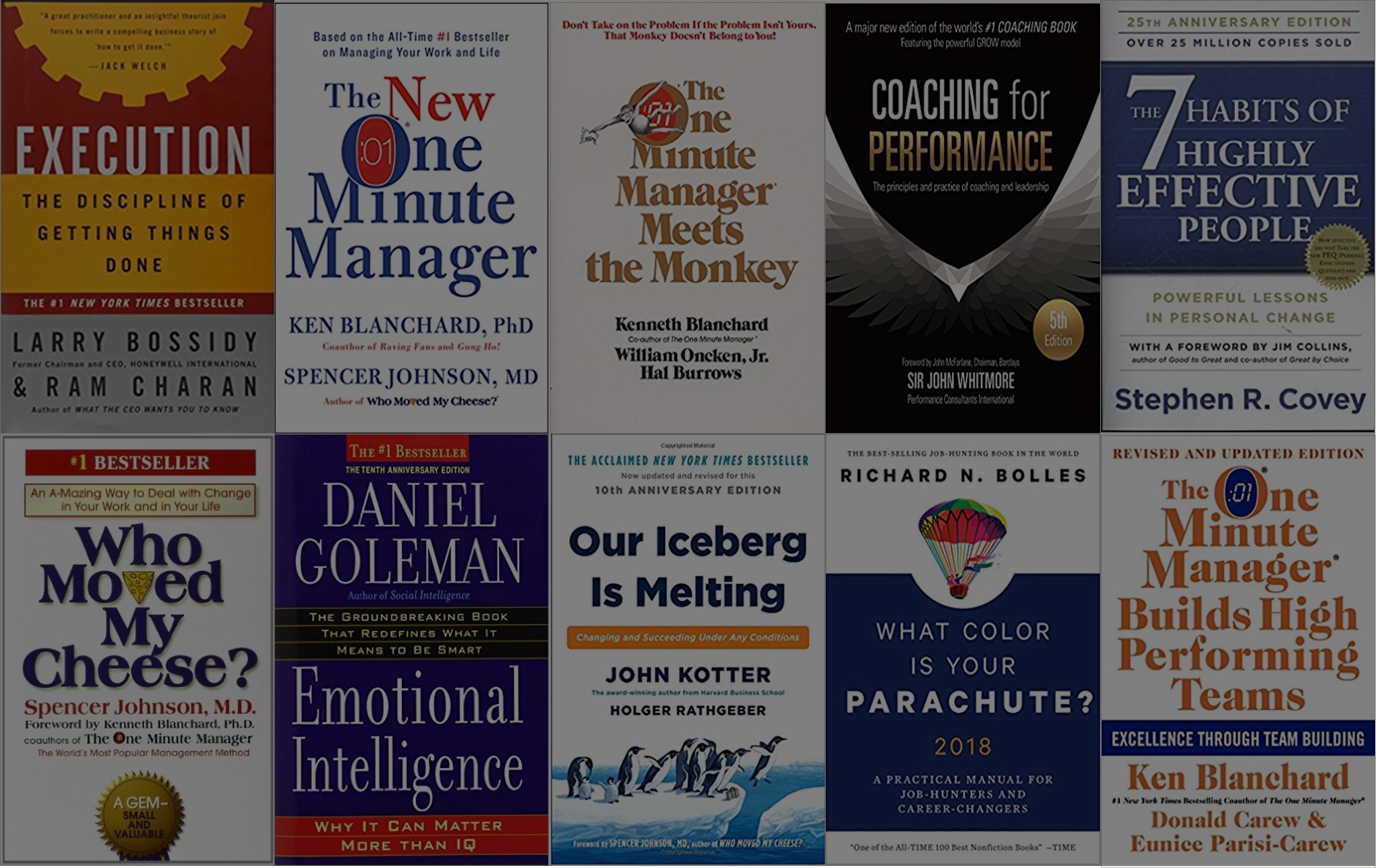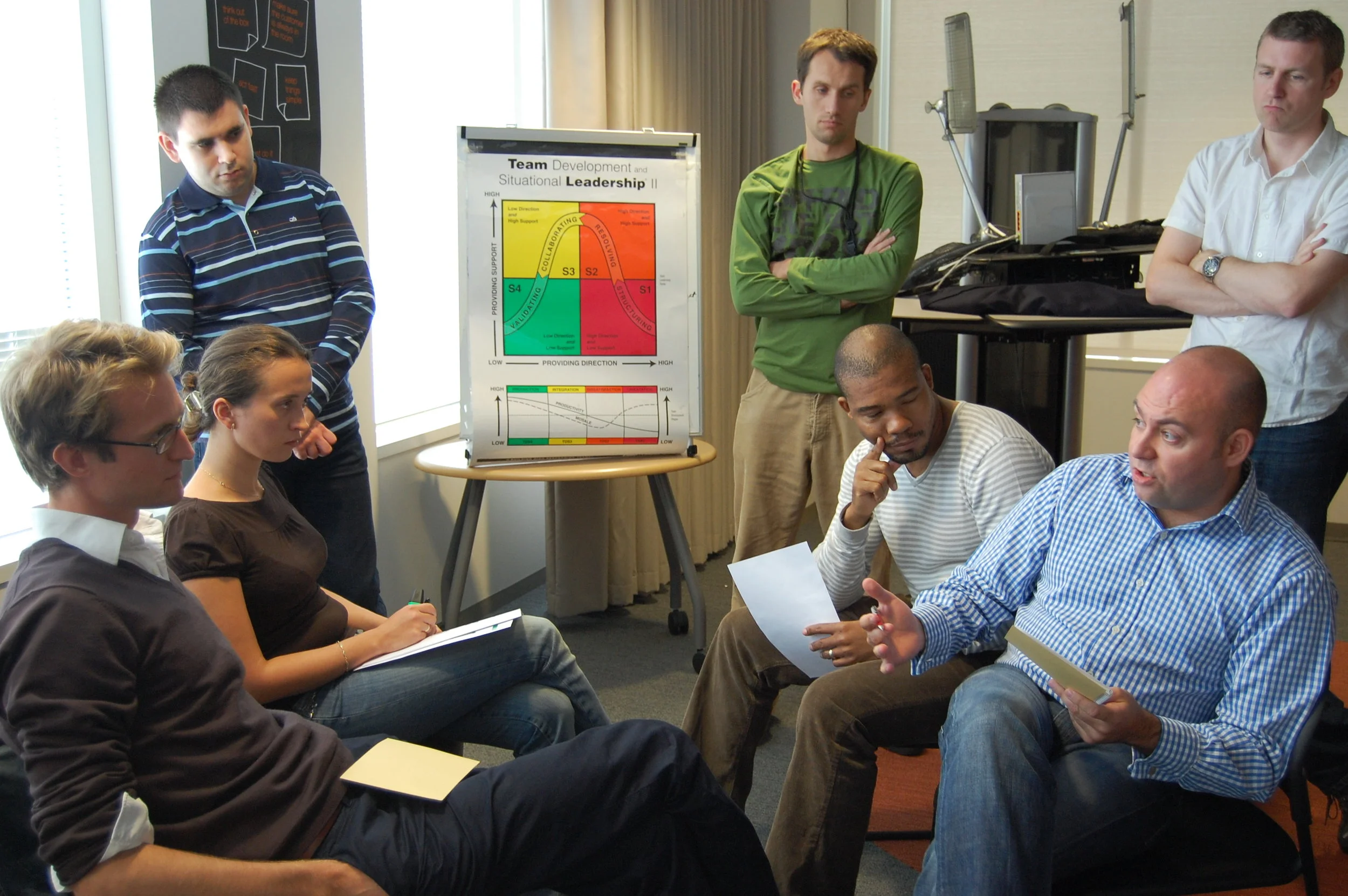Do you have a blue print for creating the life you are dreaming about? Do you know what your success looks like? Are you willing to take the steps to get there and walk the talk? Like most people, you deserve to be successful but you may not have an effective system to rely on. You need a plan, methods to use every day and a support system that keeps you energized and inspired.
What is the difference between an amateur manager and a pro?
5 ways to spot when your executive team is in trouble
A former executive MBA student of mine sends me an email asking for help. As the CEO and president of his booming company, he struggles to rally all of his troops in the same direction and get them out of their comfort zone to boost innovation. He would like his founding partners and associates to stop working in silos and expand their impact, transversally. Trust is low; those experts in their field need to become leaders in the company. Product launches are uncoordinated and he sees a major risk in delivering his vision within the coming years. Does this seem familiar?
Here are 5 indications that serious disappointment lies ahead, and what to do about it.
Making Every Day A Million-Dollar Day
Become a Master at anything you do
Hervé Da Costa - Learn leadership from Karate - Develop your excellence Embrace leadership mastery and learn from Karate-Do Learn the 4 levels of awareness and competence. Discover the 3 key principles that create Mastery. I am sharing the key lessons from over 40 years of martial arts practice on 3 continents: Africa, Europe, and the US. I introduce the foundations of my leadership development approach and how you can transform yourself durably - create the best version of yourself.
What Does It Take To Manage My Boss?
"I am repeatedly blamed for not being strategic enough." This executive’s boss continually says: You do not spend enough time looking at the overall picture … you are too operational … you need to adopt a strategic perspective … you must spend more time studying our competitors and understanding our customer more deeply. Ouch. Here is how to make this a lot better.
Why Do Successful Executives Behave Like Thugs?
Most executives will not admit that their behaviors could be perceived as subversive; they may sincerely not realize that they are. What are people complaining about in company hallways? This article by Hervé Da Costa discusses the key reasons for those behaviors and how to begin to address them to elicit real positive change — Everybody Wins.
Empower yourself at work, now!
When I start my workshops, I ask people, "Who wants job security? Raise your hand if you want job security." It should come as no surprise that everyone raises their hand.
"Who wants to work less and achieve more?" I ask. And I hear, "Oh, me," as they raise their hand again.
"Who wants to get out of the rat race, and control their destiny?" I say, at which point I’m greeted with broad smiles, and everyone shouts, "ME!"
If you would answer these three questions, in the same way, you are exactly where you need to be — right here, reading this.
To start, one very important question I want to ask you, the same that I ask of all of my students, my participants, my executives, is:
What level of play do you want?
By that, I mean: Do you want to play in league three? Or do you want to play in league one? Are you content to play in the minor leagues? Or do you see yourself playing in the major leagues?
First off, if you are reading this you are likely quite assertive and ambitious. So I’m guessing you’re like most people who would say league one, right? Because nobody’s goal is ever to settle for mediocrity.
Now, if you don't want to settle for mediocrity, you have to be willing to learn. You have to want and learn to develop the best version of yourself. How do you do that?
Most companies, unfortunately, don’t approach this the right way, because they approach it one-dimensionally, one way, in one direction, something that, regrettably, produces little change or result. They do pieces of training. A lot of people might read a book or watch a YouTube video and feel themselves getting really motivated. But it doesn't last. It’s not enough sustenance. It doesn't create lasting results. You need to continue to feed the hunger in yourself a steady diet of what motivates you. So, the question is:
How do you transform yourself?
I am going to share with you the three dimensions of how to succeed at work.
DEVELOP YOURSELF IN 3 INTERDEPENDENT WAYS
CHANGE HOW YOU SEE YOURSELF: YOU ARE NOT AN EMPLOYEE — YOU ARE THE SOLUTION
MAKE 1 + 1 EQUAL MORE THAN JUST 2
Let’s look at each of these.
1. DEVELOP YOURSELF IN 3 INTERDEPENDENT WAYS
I want you to see yourself as investing in developing yourself in 3 complementary aspects. The first aspect of success at work is to develop yourself consistently, all the time. It means focusing on your mindset, your motivation, your engagement, staying positive, being proactive, and being self-aware. You want to solicit feedback, know where you are, and really be aware of your mindset. The mindset dimension is foundational.
The second aspect is your discipline and consistency. Most CEOs I work with, most senior managers, most mid-level managers, most contributors — all over the planet — come with the same problem. “I'm not being consistent,” “I'm not disciplined,” and “How do I stay disciplined, daily?”
It's hard. I’m not saying it isn’t. Yes, it's hard, but there are simple high-performance habits that you can learn, that I can teach you. And I provide lots of complementary videos and short courses on the right simple yet foundational habits and methods designed to develop your discipline. This is fundamental.
Finally, the third aspect is to remove toxicity, from both outside and inside yourself. Outside is generally the programming you get from the society around you. From the people around you. From preconceived opinions. From the imprint we all have — which is toxic. You may have people around you who are relentlessly negative. Well, we need to get rid of them. We need to get rid of the toxicity. Become aware of the toxicity outside of you, and the people who may be dragging you down.
Okay, now it’s time to work on the toxicity inside of you: the voices that whisper: You’re not good enough. You’re not the right person. Success is not going to happen to you. You don't deserve this. All of this internal toxicity is about self-awareness. Maybe calming your mind and we will work on that.
2 . CHANGE HOW YOU SEE YOURSELF: YOU ARE NOT AN EMPLOYEE — YOU ARE THE SOLUTION
The second dimension is to reframe how you think about your job, your function, your role. You may be pretty high up there, or somewhat below that, but, regardless, you have a job to achieve. And the first way to view this is to stop defining what you do as that you “have a job.”
Instead of approaching it from your skillset, what you can do, ask what are the problems that you can solve. See yourself always as the solution, and your goal as being better and better at becoming the person who delivers a solution at work. That's really important. In order to deliver the solution, you must know how to manage meetings, manage people, work better with your managers and your boss (i.e., manage your boss) — you must learn how to do that and practice it continually.
You need to cut down on wasting time. You need to orient people.
And here is the hardest thing that most people don't do: They don't think enough. They don't take the time to ask the right questions. People love doing. That’s why, in most projects where people start too early, most projects fail. In contrast, if you are the person who can come in and say, "Wait a minute, let's think this through. Let’s analyze more deeply, identify the real problem, ask the ‘Why?’ question." When you do that, you become priceless. And that's the opportunity available to you at work.
3 . Make 1 + 1 greater than 2
The third dimension is the collective. It comprises how you work with other people, and how you get a team or group to collaborate well. See that as your being the super app. That's where there's basically no competition. When you become really good at doing this, you erase any of your competitors at work, or outside your company, outside your business.
So, how do you get people to collaborate? To speak to each other? To listen to each other? To work together? To align? To think together? Your goal here is to make one plus one equal more than just two. If you can do that, you're home. The challenge? Rarely does anyone do that.
That’s why I am sharing with you how to create consistently high-performing teams and groups. You will be the facilitator, the one who coaches the manager, the project manager, or the influencer in there. Believe me: That's the whole piñata.
Are you ready? Because, now, you can see my system is not about doing a one-shot thing, making a one-off effort. You don’t just read a bucket of books or attend a whole bunch of workshops and find yourself magically transformed. It's about developing your success system and getting really good within this framework, and making it work for you, day in and day out, both professionally and personally. Because once you make these changes professionally, you’re going to use them in your personal life too, to improve the communication and collaboration you experience with everyone. It’s exhilarating!
Think of it as moving your life, your own self, from 2D to 3D. Every small step makes a positive difference, so even when you’re only starting, when you make just a little progress on these 3 dimensions, you will feel and act differently. You differentiate yourself and make yourself unique, immediately. And you’ll find that the results will be just short of amazing. Astonish and impress yourself, and you’ll astonish and impress those around you.
Doesn’t that sound exciting? Let’s accelerate your development. Learn more about our accelerated leadership program XCELERATOR.
If you have any questions, please comment below. I read every comment and will get back to you with the answers you need.
What Busy Professionals Can Do to Boost Their Career Skills for Post-Pandemic Growth
— Written in partnership with Tina Martin at Ideaspired.com —
If you’re a busy professional with little time to spare, these resources below will help you to boost your career skills for post-pandemic growth — all without falling behind on your current duties and responsibilities. In fact, you’ll even learn how to better manage your time and become a more effective and efficient business leader. Read on to get started!
Learn on the Side
Even as a busy business leader, there are so many convenient ways to further your education and boost your career skills if you’ll be pursuing new job opportunities post-pandemic.
● Find out which skills will be needed in a post-pandemic world and start mastering them with online classes and tutorials. Some of the best online learning platforms for business professionals include 360 Training, Udemy, Khan Academy, Coursera, and Skillshare.
● Earn an online degree. For example, you can find flexible bachelor’s or master’s degree programs in K-12 teaching, business management, health leadership, or data analytics.
● Find and attend a SCORE workshop or webinar. For example, you can learn start, grow or sell your business. Topics range from human resources and customer relations to accounting, marketing, and operations.
● Apply to Hervé Da Costa’s leadership acceleration program.
Improve Your Time Management Skills
Time management is an essential soft skill that all business leaders must possess in order to excel in their careers.
● Learn how to manage your time, prioritize tasks, and delegate successfully.
● Use productivity tools and apps such as Airtable, Notion, Front, and Double.
● Find out what other CEOs are doing to stay focused, motivated, and in control of their time.
● Practice mindfulness to quiet the mind and boost mental clarity.
Lead More Effectively and Efficiently
These resources will help you to become a more effective and efficient leader.
● Get the Free Leadership Acceleration Training available from Hervé.
Read 10 business leadership books, including “Execution: The Discipline of Getting Things Done” by Larry Bossidy and Ram Charan.
● Listen to 10 of the best TED Talks for leaders.
● Connect with other business professionals using social networking sites such as LinkedIn, GroupMe, and Shapr.
● Listen to leadership podcasts. Some of the best podcasts for leaders include “Recode Decode” with Kara Swisher, “HBR IdeaCast”, and “No Ego”.
Once you’ve dedicated some time to boosting your career skills and learning how to become a better leader, you’ll be ready to take advantage of emerging business opportunities in industries such as eCommerce and telemedicine. And if you need some guidance or training along the way, don’t hesitate to enlist the help of the professionals at Hervé.
5 erreurs clés à éviter lorsque vous transformez votre organisation
10 articles to help you become a better leader overnight
3 key characteristics of resilient people
In my book What Color Is Your Sky?, I introduce the concept of living on the green curve, a resilient, focused, proactive way of living daily. Learning and perfecting specific life skills and attitudes can be a game-changer. In particular, I encourage you to read and practice the Deliberate Morning Program.
This implies that, over time, you learn from hardship and persist. How can you suffer real setbacks and not falter? During these times of anxiety and deep change, what helps people ultimately bounce back? Find out how resilience at work can literally save lives.
“More than education, more than experience, more than training, a person’s level of resilience will determine who succeeds and who fails. That’s true in the cancer ward, it’s true in the Olympics, and it’s true in the boardroom.” — Dean Becker, president, and CEO of Adaptive Learning Systems.
Resilience can be learned. I recently read an excellent article from Harvard Business Review: “How Resilience Works,” by Diane Coutu, director of client communications at Banyan Family Business Advisors, headquartered in Cambridge, Massachusetts, which introduces 3 characteristics that may reinforce this:
Face and accept reality: Resilient people have down-to-earth views that matter for survival. Pushing for a sense of possibility is powerful, but for longer or bigger challenges, a grounded sense of reality is far more important. Ask yourself: “Do I truly understand—and accept—the reality of my situation? Does my organization?”
Search for meaning: Reframing your situation and seeking a deeper meaning to what is happening can mean the difference between giving up and hanging in there, believing in a better-constructed future. The reference book on this matter is Viktor Frankl’s book Man’s Search for Meaning. I encourage you to spend time clarifying your personal purpose and that of your company’s.
Become a bricoleur: Keep bouncing back by doing the most with what you have. You may need to improvise solutions from thin air. This calls for agility, positivity, and enthusiasm.
Are you facing serious transformational challenges in your company? If you are, simply drop me a line at sky@herve.com.
5 key leadership principles to learn from Karate Do
The 10 books all manager-leaders should read immediately.
Coming out of the crisis — how?
Coming out of the crisis successfully requires three fundamental factors: proper anticipation, conscious risk taking, and high coordination, more than ever. The question becomes: who can anticipate and plan with you effectively? And can you, together, analyze at deeper levels than usual, how to orchestrate the process of going back to a new world.
10 questions fondamentales auxquelles les PDG doivent savoir répondre
Comment manager mon patron ?
10 core questions CEOs should be able to answer and why
Being able to answer core questions helps CEOs define the culture, the soul of the company and greatly impact the engagement of its managers. Furthermore, it inspires them to make better tactical decisions. Here is a list of questions that a CEO or senior managers should spend time on and be prepared to answer.
























